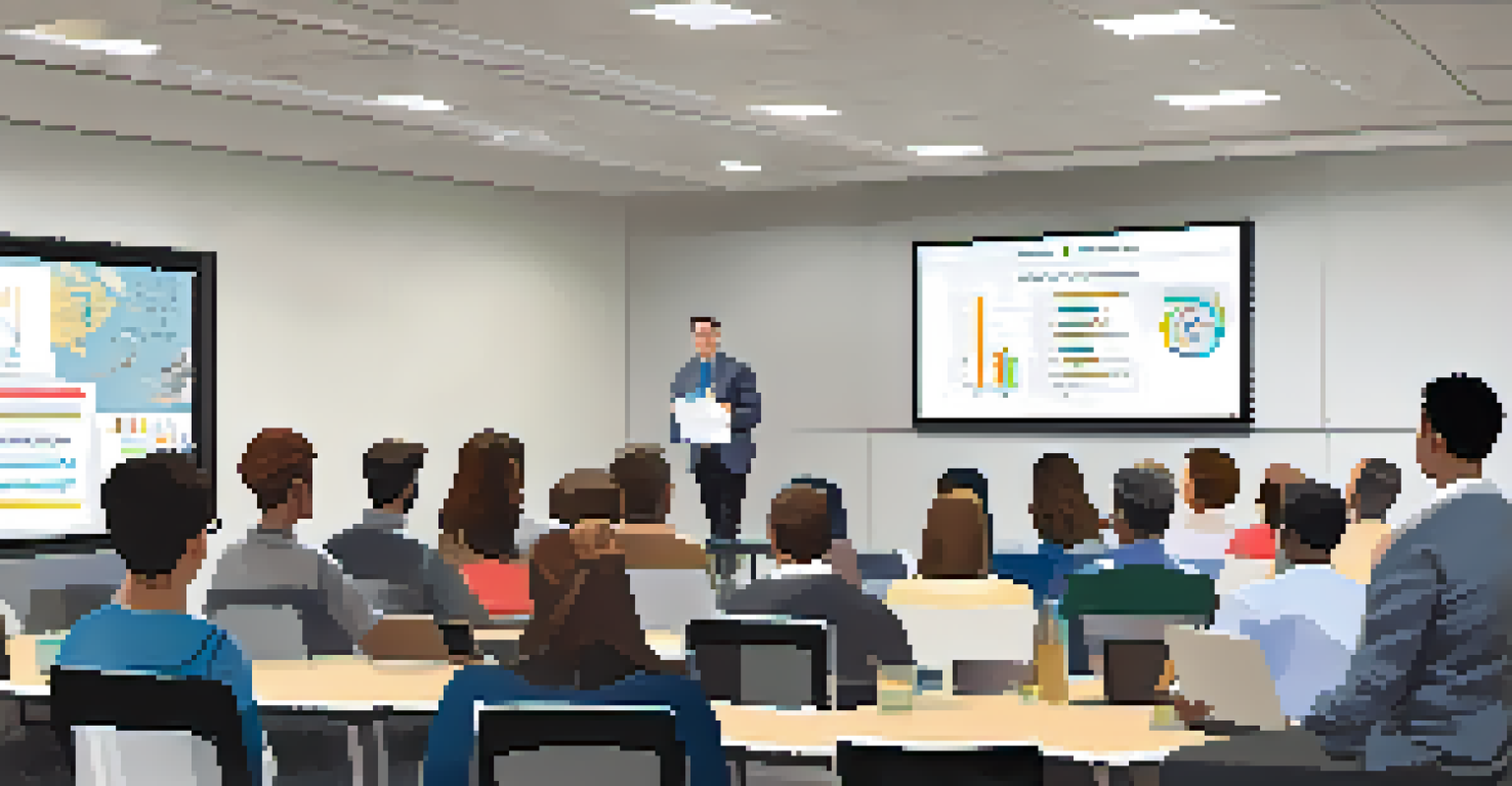Creating Effective Professional Development for Personalized Learning

Understanding Personalized Learning in Education
Personalized learning tailors education to meet individual student needs, preferences, and interests. This approach encourages learners to take charge of their educational journey, making it essential for teachers to adapt their methods. By recognizing the unique learning styles of each student, educators can foster a more engaging and effective classroom environment.
Personalized learning is the bridge that connects students to their own learning pathways.
To implement personalized learning effectively, educators must first understand the diverse backgrounds and abilities of their students. This means gathering data on student performance, interests, and learning styles. Such insights allow teachers to create customized learning experiences that resonate with each individual, promoting a deeper understanding of the material.
Ultimately, personalized learning is not just about individualization; it's about creating a dynamic classroom culture where every student feels valued and empowered. This shift in focus requires professional development that equips educators with the necessary skills and knowledge to support this approach.
Identifying the Needs of Educators
Before designing professional development programs, it's crucial to assess the needs of educators. Surveys, interviews, and focus groups can provide valuable insights into what teachers feel they require to support personalized learning effectively. By understanding these needs, agencies can create targeted training that resonates with educators and enhances their teaching practices.

For example, a school may find that teachers struggle with integrating technology into their lessons. By offering workshops that focus on specific tools and strategies, educators can gain the confidence to utilize technology to facilitate personalized learning. This targeted approach not only builds skills but also directly addresses the challenges teachers face in the classroom.
Personalized Learning Empowers Students
Personalized learning tailors education to individual student needs, fostering engagement and ownership of their learning journey.
Additionally, ongoing feedback from educators can help refine professional development programs over time. By creating a culture of continuous improvement, agencies can ensure that their training remains relevant and impactful, ultimately leading to better student outcomes.
Creating Collaborative Learning Opportunities
Collaboration among educators is a powerful tool for professional development. When teachers come together to share experiences and strategies, they can learn from one another and develop a collective understanding of personalized learning. This collaborative spirit can lead to innovative practices that benefit both educators and students.
The greatest sign of success for a teacher is to be able to say, 'The children are now working as if I did not exist.'
For instance, forming professional learning communities (PLCs) allows teachers to discuss successes and challenges in implementing personalized learning. These groups can provide support, resources, and accountability, fostering an environment where educators feel encouraged to experiment with new approaches. As teachers collaborate, they can develop a shared vision that drives the entire school community toward personalized learning.
Moreover, collaboration extends beyond the classroom. By partnering with local organizations or experts in the field, educators can access additional resources and knowledge. This interconnectedness enriches professional development and ensures that teachers are well-equipped to meet the diverse needs of their students.
Utilizing Data-Driven Decision Making
Data-driven decision making is critical in personalizing learning and shaping effective professional development. Educators must analyze student data to identify areas of need and track progress over time. This approach allows teachers to make informed decisions about instructional strategies and interventions that will support individualized learning.
For example, by examining assessment results, teachers can pinpoint specific skills where students may be struggling. This information can guide professional development sessions focused on those areas, ensuring that educators have the tools needed to help their students succeed. When data informs practice, it creates a cycle of continuous improvement for both teachers and learners.
Collaborative Development for Educators
Collaboration among educators through professional learning communities enhances the sharing of strategies and support for personalized learning.
Furthermore, educators can also use data to reflect on their teaching practices. By evaluating the impact of their strategies, they can make adjustments that enhance effectiveness. This commitment to using data not only supports personalized learning but also fosters a culture of accountability among educators.
Incorporating Technology into Professional Development
Technology plays a crucial role in personalized learning, making it essential for professional development programs to incorporate digital tools. Educators should be equipped with the knowledge and skills to effectively integrate technology into their teaching practices. This enables them to create engaging learning experiences that cater to the diverse needs of their students.
For instance, online platforms can facilitate access to resources, collaborative projects, and even virtual coaching sessions. By leveraging technology, educators can connect with experts and peers beyond their immediate environment, enriching their learning experience. This flexibility allows for personalized professional development that fits the busy schedules of teachers.
Moreover, technology can also provide educators with real-time feedback on their teaching practices. Tools such as video recordings or online assessments allow teachers to evaluate their performance and make necessary adjustments. By embracing technology, educators can enhance their skills and better support personalized learning in their classrooms.
Fostering a Growth Mindset in Educators
A growth mindset, the belief that abilities can be developed through dedication and hard work, is essential for educators engaged in personalized learning. By fostering this mindset, professional development can empower teachers to embrace challenges and view failure as an opportunity for growth. This perspective encourages educators to continually seek improvement in their teaching practices.
For example, professional development programs can include discussions and activities that emphasize resilience and adaptability. Encouraging teachers to share their struggles and successes helps normalize the learning process, making it easier for them to take risks in their classrooms. This supportive environment nurtures a culture of learning, where educators feel safe to innovate and experiment.
Data-Driven Decisions Improve Outcomes
Utilizing data-driven decision making allows educators to identify student needs and refine their teaching practices for better learning results.
When educators adopt a growth mindset, their enthusiasm and commitment to personalized learning are contagious. Students can sense this positivity, which can inspire them to adopt a similar attitude toward their own learning journeys. Thus, cultivating a growth mindset not only benefits educators but also enriches the entire learning environment.
Measuring the Impact of Professional Development
To ensure the effectiveness of professional development initiatives, it's crucial to measure their impact on both educators and students. Organizations should establish clear objectives and indicators of success before implementing any training programs. This allows for a systematic evaluation of whether the professional development is achieving its intended outcomes.
For instance, pre- and post-training assessments can gauge educators' knowledge and skills, while student performance data can illustrate the direct effects of these initiatives. By collecting and analyzing this data, agencies can identify areas for improvement and make necessary adjustments to their programs. This ongoing evaluation process is vital in maintaining the relevance and effectiveness of professional development.

Additionally, gathering feedback from educators about their experiences can provide valuable insights into the training process. Understanding what worked well and what didn’t can inform future professional development efforts, ensuring that they continue to evolve and meet the dynamic needs of educators and students alike.